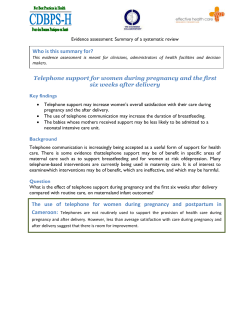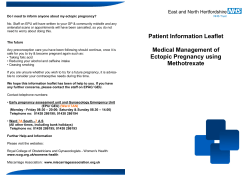
Misoprostol for the termination of pregnancy up to 12 A. Faúndes
International Journal of Gynecology and Obstetrics (2007) 99, S172–S177 a v a i l a b l e a t w w w. s c i e n c e d i r e c t . c o m w w w. e l s e v i e r. c o m / l o c a t e / i j g o REVIEW ARTICLE Misoprostol for the termination of pregnancy up to 12 completed weeks of pregnancy A. Faúndes a,⁎, C. Fiala b , O.S. Tang c , A. Velasco d a Department of Gynecology and Obstetrics, State University of Campinas (UNICAMP), Campinas, SP, Brazil Gynmed Clinic, Vienna, Austria c Department of Obstetrics and Gynecology, University of Hong Kong, Hong Kong SAR, China d Department of Gynecology and Obstetrics. Hospital Eusebio Hernández (Maternidad Obrera), Havana, Cuba b Recommended Dosage Vaginal misoprostol 800μg 6 hourly x3 KEYWORDS Misoprostol alone; Medical abortion; Effectiveness Abstract The aim was to review the current knowledge about the use of misoprostol alone for abortion induction during the first 12 weeks of pregnancy. Publications reporting experiences with misoprostol alone for pregnancy termination within the first 12 weeks of pregnancy were included in the analysis. Vaginal administration of 800 μg repeated up to three times at 6, 12 or 24 h intervals has an 85% to 90% effectiveness, defined as complete abortion, in most studies. Oral administration is less effective, but sublingual administration at 3-hour interval has the same effectiveness, with more frequent side effects. The oral and sublingual routes appear to be better accepted than vaginal administration. Most studies are limited to the first 9 weeks of pregnancy. The experience on pregnancy termination between 10 and 12 weeks is not yet sufficient for a recommendation. © 2007 International Federation of Gynecology and Obstetrics. Published by Elsevier Ireland Ltd. All rights reserved. 1. Introduction It is estimated that 46 million pregnancies are terminated voluntarily each year, 27 million carried out under safe conditions and 19 million falling into the category of “unsafe abortions” [1]. Until the second half of the twentieth century, dilatation and curettage (D & C) was the most common and virtually only method used for safe termination of early pregnancy. Abortion by vacuum aspiration gained greater acceptance in the 1960s and has become the standard of care. First trimester pregnancy can also be terminated safely pharmacologically (medical abortion). ⁎ Corresponding author. Tel.: +55 19 3289 2856; fax: +55 19 3289 2440. E-mail address: afaundes@unicamp.br (A. Faúndes). The regimen of mifepristone followed by a suitable prostaglandin analogue (usually misoprostol) has become increasingly available and is now the gold standard for this indication. Mifepristone is an antiprogestin that blocks most progesterone receptors. When a prostaglandin is administered 24 to 48 h after mifepristone, uterine contractions expel the products of conception and the effectiveness of the combination is greatly enhanced. This medical abortion regimen is highly effective and well accepted [2–4] and women who wish to avoid invasive procedures regard medical abortion as a more natural and preferable option [5]. The combination of metrotrexate and misoprostol has also been used, but this combination has not proven advantages over misoprostol alone. 0020-7292/$ - see front matter © 2007 International Federation of Gynecology and Obstetrics. Published by Elsevier Ireland Ltd. All rights reserved. doi:10.1016/j.ijgo.2007.09.006 Misoprostol for the termination of pregnancy up to 12 completed weeks of pregnancy Where mifepristone is not accessible, various misoprostolonly regimens are being used, and dozens of reports have been published on the outcomes of various treatments. The comparison of the results of the published data on the use of misoprostol is not possible due to a lack of uniformity in many variables: intervals between doses vary from 3 to 48 h, the time point for assessing this outcome varies from a few days to several weeks (Table 1), and the gestational age of women differs between reports. These factors make it difficult to conclude what regimen might be the most effective. Most publications report vaginal administration of multiple doses of 800 μg of misoprostol (4 tablets of 200 μg) [4,6–13] up to three doses. The available information suggests that effectiveness is dose related with doses up to 800 μg if administered by the vaginal route [14]. When misoprostol is used alone, the oral route is less effective than vaginal [15–18]. Vaginal administration should therefore be chosen unless there are reasons to avoid it. The sublingual route is a reasonable alternative and may be used as second choice. Alternative routes may be sought as some acceptability studies, have shown that women prefer a non-vaginal route [19,20]. Moreover, when given vaginally, fragments of the tablets may remain visible for many hours. The sublingual route is a reasonable alternative [19,21,22]. Although the sublingual route is significantly less effective than the vaginal route if misoprostol is administered every 12 h, the effectiveness is similar if administered with a 3-h interval between doses [22]. The main drawback of the sublingual route is that it may cause more frequent gastrointestinal side-effects (such as nausea, vomiting, shivering and hyperthermia) than vaginal administration [22]. These side effects are dose dependent and last only for a short time. Table 1 S173 Recently, the buccal route of administration has also been investigated, but not yet for this indication [23]. Intervals between doses vary from 3 [22] to 48 h [8,23]. According to pharmacokinetics and clinical experience, the interval between vaginal doses may not need to be shorter than 5–6 h [24,25] and probably no longer than 24 h. There is experience on the use of these regimens up to 63 days (9 weeks) pregnancy [23,26,27], but too few reports on the use of misoprostol between 9–13 weeks [7,28] to affirm that these regimens are equally effective during that period. The misoprostol-only regimen has been approved for the termination of early pregnancy in only one country (Brazil) at the time of writing (February 2007). However, its widespread use in countries with restricted abortion laws appears to be associated with reduction in maternal morbidity and mortality [29–32]. 2. Contraindications • Known allergy to misoprostol. • Suspected ectopic pregnancy or non-diagnosed adnexal mass. • Unstable hemodynamics. 3. Precautions • If molar pregnancy is diagnosed, intrauterine aspiration and curettage is preferred [33]. • If there is an intrauterine device (IUD) in place, this should be removed before administering misoprostol. • Coagulation disorders/currently taking anticoagulants. • Women should be advised that the treatment can fail and they should be prepared to terminate the pregnancy by Summary of studies with vaginal administration of misoprostol alone for first trimester abortion Author Gest. Doses N age Interval No. Observ. doses time Complete Cont. Nausea abortion pregnancy Vomit Diarrhea Hyperthermia Shivering [14] [14] [7] [8] [8] [9] [23] [23] [10] [10] [51] [13] [11] [27] [27] [26] [18] [18] [22] [22] 12 h 12 h 24 h 12 h 24 h 24 h 48 h 48 h 24–7 days 7 days 24 h 24 h 24 h 8h 8h 12 h 24 h–7 days 24 h 3h 12 h 4 4 3–5 3–5 3(?) 2 3 3 3 2 3 3 3 3 6 3 2–3 2 3 3 23% 46% 87% 85% 89.4% 88% 85% 65% 90.7% 92.1% 88.8% 87.5% 93.0% 86.3% 90.5% 91.0% 80.4% 66.0% 87.1% 85.5% 6% 11% 17% 17% 23% 14% 2.5% 5.0% 36% 4.9% 21.5% 14.4% 29% a 20% – 21.6% 31.4% 16.3% 6.2% a 5–11 5–11 10–11 10–13 5–9 ≤8 ≤9 ≤9 ≤8 ≤6 ≤8 ≤8 ≤8 ≤9 ≤9 8–9 ≤8 ≤8 ≤9 ≤9 Moistened. 200 400 800 800 800 800a 800 a 800 800 a 800 a 800 a 800 a 800 a 800 a 800 a 800 a 800 a 800 a 800 a 800 a 101 113 120 180 720 100 40 40 75 101 125 160 100 450 450 162 51 50 498 487 48 h 48 h 14 days 14 days 48 h(?) 15 days 15–43 d. 15–43 d. 8 days 8 days 15 days 72 h 72 h 24 h 48 h 72 h?– 7–8 days 7 days 14 days 14 days 61% 34% 6.7% 7.2%– 6.5% – 2.5% 10% 4.0% – – – 5% 5.6% 3.3% – 5.9 4.0% 4.0% 5.0% 19% 20% 22% 16% 24% – 15% 7.5% – 21.4% 51.7% (18.1%) a – 29.1% – 30.8% 43.8% 30.6% 23.6% 7% 6% 54% 54% 50% 9% 2.5% 0.0% 56% 12.6% 11.2% 15.6% 23% a 11.6% – 12.3% – – 23.1% 22.8% – – 26% 14% 18% (5 – – (88.0%) – (71.5%) – (77%) 15.3% – 15.4% (82.4%) (52.1%) 15.5% 5.4% – – 72% 28%– 49% 5) – – – 48% – 46.2% 36.5% 32.1% S174 surgical method, because there have been reports of congenital malformations in newborn infants of mothers given misoprostol during the first trimester of pregnancy [34]. • Breastfeeding: Small amounts of misoprostol or its active metabolite may appear in breast milk [35]. There is no information on the effects on nursing infants. It is recommended therefore that breast milk is not given to the infant for 4 h after oral administration or 6 h after vaginal misoprostol administration. • Anemia detected at the time of abortion should be treated without delaying the procedure. The average blood loss during medical abortions may be more than in surgical abortions [36–38]. • Previous cesarean section: there is evidence from one study that the safety and efficacy of early abortion (up to seven weeks) is unaffected by previous cesarean section [39]. Although extremely rare, uterine rupture in early pregnancy has been described [40]. 4. Regimen 4.1. Dose/route of administration The first choice is 800 μg administered by the vaginal route every 6, 12 or 24 h for a maximum of three doses. Three doses of 800 μg at 3-hourly intervals can also be used sublingually [22]. Moistening the tablets appears to slightly increase plasma levels [41], but no improvement in the clinical effects has been demonstrated [42]. Doses higher than 800 μg are not recommended due to increased side effects [43,44]. 4.2. Course of treatment Several studies carried out in developed and developing countries have shown that home administration of misoprostol is effective and safe up to 9 weeks since the last menstrual period. Most of those studies have been done using the combination of mifepristone and misoprostol [20,45–48] and only a few with misoprostol alone [8,27]. Prerequisites: • Voluntary termination of the pregnancy and informed consent of the woman about her choices and the nature of the procedure. • Backup arrangements for surgical abortion. • Dating of gestational age and ruling out ectopic pregnancy according to local standards. • If required by national guidelines, blood group and Rhesus factor should be determined and in cases where women are Rhesus negative, a dose of anti-D serum should be administered prior to treatment. However, there is currently little evidence to support that Rhesus factor isoimmunization occurs for pregnancies up to 63 days gestation [49,50]. Where resources are available, and depending on the clinical situation, the following tests may be useful: • Hemoglobin, hematocrit and screening for STDs may also be provided depending on local prevalence and guidelines. In addition, serological tests to diagnose for syphilis, HIV and hepatitis B and C surface antigen may also be used. A. Faúndes et al. 5. Effectiveness Despite the wide range of results from different studies and different regimens, the success rate, defined as a complete abortion, is around 90% during the first trimester of pregnancy (Table 1). Success depends on the length of the time interval between treatment and the assessment of the outcome. Depending on the regimen used, pregnancy continues in 4% to 8% of women with gestational age of up to 63 days when vaginal misoprostol is used alone (Table 1). 5.1. Time to achieve effect In the majority of cases, expulsion of the products of conception occurs hours after administration: close to 70% within the first 12 h [14,26,28], around 80% during the first 24 h, 95% within 48 h and further increases until at least 72 h after the initial dose [4,6,13,28,51]. However there may be a large variability depending on route, dose and time interval between misoprostol doses. 6. Effects and side effects Prolonged or serious side effects are rare. 6.1. Bleeding Vaginal bleeding during abortion induced with misoprostol is generally more intense than regular menstrual bleeding and is usually no different from that which occurs with a spontaneous abortion [45]. Although there may be great variations, there is typically menstrual-like or heavier bleeding for the first week and then spotting for an additional week. The mean pre- to post-abortion fall in hemoglobin varies between 0.2 and 1.0 g/dL (Table 2). Prolonged and intensive bleeding affects between 1% and 10% of women and may necessitate emergency surgical uterine evacuation, preferably with manual vacuum aspiration. The need for transfusion has been rarely reported (Table 2). 6.2. Cramping Cramping usually starts within the first few hours and may begin as early as 30 min after misoprostol administration. The pain may be stronger than that experienced during a regular period and can be present in 80%–90% of women [22]. Nonsteroidal anti-inflammatory drugs (NSAIDs) or other analgesia can be used for pain relief without affecting the success of the method [11,52]. 6.3. Fever and/or chills Chills are a common side effect of misoprostol but are transient. Hyperthermia can be very severe [43] and more common with higher doses when the interval between doses is shorter or with oral or sublingual administration [3,22,52]. Fever does not necessarily indicate infection. An antipyretic can be used for relief of fever, if needed. If fever or chills persist beyond 24 h after taking misoprostol, Misoprostol for the termination of pregnancy up to 12 completed weeks of pregnancy Table 2 Ref Indicators of bleeding in clinical studies of misoprostol alone for first trimester abortion (n) Duration Mean reduction in Hg Excessive bleeding Transfusion Regime – – 2% 5% 11% a 0% 4.8 b – – 1.2 0.0 0.0 0.3 0.0 0.0 0.0 0.0 1.2 – – 200 × 4 °C/12 h 400 × 4 °C/ 12 h – 800 × 2 °C/24 h 800 × 2 °C/24 + 1 day 8th 800 × 3 °C/48 h 800 × 3 °C/24 h 800 × 3 °C/24 h 800 × 3 °C/8 h + 600 800 × 3 °C/12 h 0% 1.1% 0.0 0.0 800 × 3 °C/24 h 800 × 3 °C/12 h Bleeding (days) Bleeding + spotting ≤ 9 weeks [14] (101) [14] (133) [8] (720) [9] (100) [10] (75) [23] (80) [4] (125) 8 (160) [27] (452) [26] (162) – – 7 7 8.2 – 9.8 – 8.6 8 – – 14 – 13 14 16 16 0.4 0.6 0.3 0.4 0.6 – 0.2 – 0.3 1.0 ≥ 10 weeks [7] (120) [28] (180) – 6 – 13 0.6 0.4 a b S175 Hg b 10.0 mg/dL. Decrease of ≥ 2 g/dl. the woman may have an infection and should seek medical attention. 6.4. Nausea and vomiting About 20% of women report pregnancy-related nausea and vomiting before treatment. These symptoms may increase after misoprostol administration. An anti-emetic can be used if needed, but symptoms will usually resolve within 2 to 6 h. 6.5. Diarrhea Diarrhea may also occur following administration of misoprostol but should resolve within a day. 6.6. Fetal abnormalities The risk of fetal abnormalities after misoprostol used early in pregnancy is probably very low [53–55], but women who do not abort after misoprostol, should have access to surgical abortion, if that is the woman's informed choice. Vacuum aspiration is the recommended option. 7. Follow-up Women should be given simple instructions on how to recognize any complications that might require medical care. Once administration of misoprostol has begun, women must have easy access to a health professional capable of answering their questions and providing them with assistance or hospital care. During the early first trimester, the possibility of ectopic pregnancy should be kept in mind. Women must be informed that they will have bleeding and cramping as described above, and that they can use NSAIDs as required. The symptoms calling for clinical care include excessive bleeding, fever of more than 1 day and abdominal pain. Antibiotic treatment should be begun immediately if there is any suspicion of infection, although it is less frequent after medical than after surgical method of abortion [56,57]. Women should return for follow-up one or two weeks after the initial administration of the drug or earlier if they feel the need. A good clinical history and bi-manual exam should enable the provider to determine the absence of symptoms and that the uterus is firm and well involuted. In case of uncertainty a pregnancy test and ultrasound examination may be needed to confirm a complete expulsion. The usual urinary pregnancy tests may be positive for up to 4 weeks following the abortion as the pregnancy hormone hCG is excreted slowly from the body. Those women who have not aborted within 72 h after the last dose should be given the option of a second course of misoprostol treatment or surgical abortion; they should be informed that their chances of success of the second course is around one in three [10,51]. If there is an urgent need to evacuate the uterus or if the woman is not prepared to accept a new attempt of treatment with misoprostol, she should be offered the alternative surgical abortion. There is clear evidence that vacuum aspiration is the preferred technique: both electric or manual vacuum aspirations are effective [58]. Women with incomplete abortion should be offered the choice of aspiration evacuation or misoprostol treatment with 600 μg of oral misoprostol if eligible [59]. 7.1. Post abortion contraception Women should be informed about immediate return to fertility, contraceptive methods, their characteristics, effectiveness and side effects, including their capacity to protect against sexually transmitted infections (STIs). After selection of the most appropriate method, that method should be provided as soon as possible [60,61]. S176 A. Faúndes et al. Acknowledgement This chapter was developed for a misoprostol expert meeting at the Bellagio Study Center in Italy, supported by the Rockefeller Foundation, Ipas, Gynuity Health Projects and the UNDP/UNFPA/WHO/World Bank Special Programme of Research, Development and Research Training in Human Reproduction. [14] [15] [16] Conflict of interest [17] The authors do not have any conflict of interest. References [18] [1] WHO-World Health Organization. Unsafe abortion- Global and regional estimates of the incidence of unsafe abortion and associated mortality in 2000. 4th edition. WHO; 2004. 82pp. Available in: http://www.who.int/reproductive-health/publications/ unsafe_ abortion_estimates _04/estimates.pdf. [2] Ashok PM, Hamoda H, Nathani F, Flett GMM, Templeton A. Randomized controlled study comparing oral and vaginal misoprostol for cervical priming prior to surgical termination of pregnancy. BJOG 2003;110:1057–61. [3] Honkanen H, Piaggio G, Hertzen H, Bartfai G, Erdenetungalag R, Gemzell-Danielsson K, et al. WHO multinational study of three misoprostol regimens after mifepristone for early medical abortion. BJOG Jul 2004;111(7):715–25. [4] Jain JK, Dutton C, Harwood B, Meckstroth KR, Mishell Jr DR. A prospective randomized, double-blinded, placebo-controlled trial comparing mifepristone and vaginal misoprostol to vaginal misoprostol alone for elective termination of early pregnancy. Hum Reprod Jun 2002;17(6):1477–82. [5] Henshaw RC, Naji SA, Russell IT, Templeton AA. Comparison of medical abortion with surgical vacuum aspiration: women's preferences and acceptability of the treatment. BMJ 1993;307: 714–7. [6] Carbonell JLI, Varela L, Velazco A, Tanda R, Sánchez C. Vaginal misoprostol for Carbonell JL. Velazco A, Varela L, Fernández C. The use de misoprostol for termination de early pregnancy. Contraception 1997;55:165–8. [7] Carbonell JL, Varela L, Velazco A, Cabezas E, Tanda R, Sanchez C. Vaginal misoprostol for late first trimester abortion. Contraception 1998;57:329–33. [8] Carbonell Esteve JL, Varela L, Velazco A, Tanda R, Cabezas E, Sanchez C. Early abortion with 800 μg of misoprostol by the vaginal route. Contraception 1999;59:219–25. [9] Jain JK, Meckstroth KR, Mishell Jr DR. Early pregnancy termination with vaginally administered sodium chloride solution-moistened misprostol tablets: historical comparison with mifepristone and oral misoprostol. Am J Obstet Gynecol 1999;181:1386–91. [10] Jain JK, Meckstroth KR, Park M, Mishell Jr DR. A comparison of Tamoxifen and Misoprostol to Misoprostol alone for early termination of pregnancy. Contraception 1999;60:353–6. [11] Jain JK, Harwood B, Meckstroth KR, Mishell Jr DR. Early pregnancy termination with vaginal Misoprostol combined with loperamide and acetominofen prophylaxis. Contraception 2001;63:217–21. [12] Velazco A, Varela L, Tanda R, Sanchez C, Barambio S, Chami S, et al. Misoprostol for abortion up to 9 weeks' gestation in adolescents. Eur J Contracept Reprod Health Care Dec 2000;5(4): 227–33. [13] Zikopoulos KA, Papanikolaou EG, Kalantaridou SN, Tsanadis GD, Plachouras NI, Dalkalitsis NA, et al. Early pregnancy termina- [19] [20] [21] [22] [23] [24] [25] [26] [27] [28] [29] [30] [31] [32] tion with vaginal misoprostol before and after 42 days gestation. Hum Reprod 2002;17(12):3079–83. Bugalho A, Faúndes A, Jamisse L, Usfa M, Maria E Bique C. Evaluation of the effectiveness of vaginal misprostol to induce first trimester abortion. Contraception 1996;53:243–6. Norman JE, Thong KJ, Baird DT. Uterine contractility and induction of abortion in early pregnancy by misoprostol and mifepristone. Lancet Nov 16 1991;338(8777):1233–6. Gemzell-Danielsson K, Marions L, Rodríguez A, Spur BW, Wong PY, Bygdeman M. Comparison between oral and vaginal administration of misoprostol on uterine contractility. Obstet Gynecol 1999;93(2):275–80. Gemzell-Danielsson K, Bygdeman M, Aronsson A. Studies on uterine contractility following mifepristone and various routes of misoprostol. Contraception 2006;74:31–5. Blanchard K, Shochet T, Coyaji K, Ngoc NTN, Winikoff B. Misoprostol alone for early abortion: an evaluation of seven potential regimens. Contraception 2005;72(2):91–7. Tang OS, Miao BY, Lee SWH, Ho PC. Pilot Study on the use of repeated doses of sub-lingual misoprostol in termination of pregnancy up to 12 weeks gestation: efficacy and acceptability. Hum Reproduction 2002;17:654–8. Arvidsson C, Hellborg M, Gemzell-Danielsson K. Preference and acceptability of oral versus vaginal administration of misoprostol in medical abortion with mifepristone. Eur J Obstet Gynecol Reprod Biol Nov 1 2005;123(1):87–91. Aronson A, Helström L, Gemzell-Danielson K. Sublingual compared with oral misoprostol for cervical dilatation prior to vacuum aspiration: a randomized comparison. Contraception 2004;69(2):165–9. von Hertzen H, Piaggio G, Huong NTM, Arustamyan K, Cabezas E, Gomez M, et al. Misoprostol for termination of early pregnancy – a randomized multicentre equivalence trial on two routes and two intervals. Geneva: WHO; 2007. Ngai SW, Tang OS, Chan YM, Ho PC. Vaginal misoprostol alone for medical abortion up to 9 weeks of gestation: efficacy and acceptability. Hum Reprod 2000;15:1159–62. Zieman M, Fong SK, Benowitz NL, Banskter D, Darney PD. Absortion kinetics of misoprostol with oral or vaginal administration. Obstet Gynecol 1997;90(1):88–92. Meckstroth KR, Whitaker AK, Bertisch S, Goldberg AB, Darney PD. Misoprostol administered by epithelial routes: drug absorption and uterine response. Obstet Gynecol 2006;108(3): 582–90. Salakos N, Kountouris A, Botsis D, Rizos D, Gregoriou O, Detsis G, et al. First-trimester pregnancy termination with 800 μg of vaginal misoprostol every 12 h. Eur J Contracep Reprod Health Care 2005;10(4):249–54. Carbonell JL, Rodriguez J, Velazco A, Tanda R, Sanchez C, Barambio S, et al. Oral and vaginal misoprostol 800 microg every 8 h for early abortion. Contraception Jun 2003;67(6): 457–62. Carbonell Esteve L, Varela L, Velazco A, Tanda R, Sanchez C. Vaginal misoprostol for abortion at 10–13 weeks gestation. Eur J Contraception and Reprod Health Care 1999;4(1):35–40. Faúndes A, Santos LC, Carvalho M, Gras C. Post abortion complications after interruption of preganancy with misoprostol. Adv Contracep 1996;12(1):1–9. Viggiano M, Faúndes A, Borges AL, Viggiano ABF, Souza GR, Rebello I. Disponibilidade de misoprostol e complicações de aborto provocado em Goiânia. J Bras Ginecol 1996;106(3): 55–61. Miller SE, Lehman T, Campbell M, Hemmerling A, Anderson SB, Rodríguez H, et al. Misoprostol and declining abortion-realted morbidity in Santo Domimgo, Dominican Republic: a temporary association. Br J Obstet Gynaecol 2005;112: 1291–6. Briozzo L, Vidiella G, Vidarte B, Ferreiro G, Cuadro JC, Pons JE. El aborto provocado en condiciones de riesgo. Emergente sanitario en la mortalidad materna en Uruguay. Situación actual Misoprostol for the termination of pregnancy up to 12 completed weeks of pregnancy [33] [34] [35] [36] [37] [38] [39] [40] [41] [42] [43] [44] [45] [46] e Iniciativas medicas de protección materna. RMU 2002;18(1): 4–14. Lichtenberg ES, Grimes DA, Paul M. Abortion complications: prevention and management. In: Paul M, Lichtenberg ES, Borgatta L, Grimes DA, Stubblefield PG, editors. A clinician's guide to medical and surgical abortion. Philadelphia (PA): Churchill Livingstone; 1999. p. 197–216. Tang OS, Gemzell-Danielsson K, Ho PC. Misoprostol: pharmacokinetic profiles, effects on the uterus and side-effects. Int J Gynecol Obstet 2007;99:S160–7 [this issue]. Abdel-Amin H, Villar J, Gülmezoglu AM, Mostafa SA, Youssef AA, Shkry M, et al. The pharmacokinetics of the prostaglandin E1 analogue misoprostol in plasma and colostrums after postpartum oral administration. Eur J Obstet Gynecol Reprod Biol 2003;108:25–8. Holmgren K. Women's evaluation of three early abortion methods. Acta Obstet Gynecol Scand 1992;71:616–23. Chan YF, Ho PC, Ma HK. Blood loss in termination of early pregnancy by vacuum aspiration and by combination of mifepristone and gemeprost. Contraception 1993;47:85–95. Prasad RN, Choolani M, Roy A, Ratnam SS. Blood loss in termination of early pregnancy with mifepristone and gemeprost. Aust N Z J Obstet Gynaecol 1995;35:329–31. Xu J, Chen H, Ma T, Wu X. Termination of early pregnancy in the scarred uterus with mifepristone and misoprostol. Int J Gynecol Obstet 2001;72(3):245–51. Kim JO, Han JY, Choi JS, Ahn HK, Yang JH, Kang IS, et al. Oral misoprostol and uterine rupture in the first trimester of pregnancy. A case report. Reprod Toxicol 2005;20:575–7. Tang OS, Schweer H, Seyberth HW, Lee SW, Chung Ho P. Pharmacokinetics of different routes of administration of misoprostol. Hum Reprod 2002;17(2):332–6. Creinin MD, Carbonell JK, Schwartz JL, Varela L, Tanda R. A randomized trial on the effect of moistening misoprostol before vaginal administration when used with methotrexate for abortion. Contraception 1999;59:11–6. Chong YS, Chua S, Arulkumaran S. Severe hyperthermia following oral misoprostol in the immediate post-partum period. Obstet Gynecol 1997;90:703–4. Chong YS, Chua S, Arulkumaran S. Sublingual misoprostol for first trimester termination of pregnancy: safety concerns. Hum Reprod 2002;17:2777–80. Schaff EA, Fielding SL, Eisinger SH, Stadalius LS, Fuller L. Low-dose mifepristone followed by vaginal misoprostol at 48 hours for abortion up to 63 days. Contraception 2000;61: 41–6. Tang OS, Lee SW, Ho PC. A prospective randomized study on the measured blood loss in medical termination of early pregnancy by three different misoprostol regimens after pretreatment with mifepristone. Hum Reprod 2002;17:2865–8. S177 [47] Fiala C, Winikoff B, Helstrom L, Hellborg M, Gemzell-Danielsson K. Acceptability of home-use of misoprostol in medical abortion. Contraception Nov 2004;70(5):387–92. [48] Ravn P, Rasmussen A, Knudsen UB, Kristiansen FV. An outpatient regimen of combined oral mifepristone 400 mg and misoprostol 400 μg for first-trimester legal medical abortion. Acta Obstet Gynecol Scand Nov 2005;84(11):1098–102. [49] Naik K, Kitau M, Setchell ME, Chard T, et al. The incidence of fetomaternal haemorrhage following elective termination of first-trimester pregnancy. Eur J Obstet Gynecol Reprod Biol 1988;27(4):355–7. [50] Fiala C, Fux M, Gemzell Danielsson K. Rh-prophylaxis in early abortion. Acta Obstet Gynecol Scand 2003;82:892–903. [51] Bugalho A, Mocumbi S, Faúndes A, David E. Termination of pregnancies of b6 weeks gestation with a single dose of 800 microg of vaginal misoprostol. Contraception Jan 2000;61(1):47–50. [52] Fiala C, Swahn ML, Stephansson O, Gemzell-Danielson K. The effect of non-steroidal anti-inflanatory drugs on medical abortion with mifepristone and misoprostol at 13–22 weeks gestation. Hum Reprod 2005;20:3072–7. [53] el-Refaey H, Templeton A. Early induction of abortion by a combination of oral mifepristone and misoprostol administered by the vaginal route. Contraception Feb 1994;49(2): 111–4. [54] Pastuszak AL, Schuler L, Speck-Martins CE, Coelho KE, Cordello SM, Vargas F, et al. Use of misoprostol during pregnancy and Mobius' syndrome in infants. N Engl J Med Jun 25 1998;338(26): 1881–5. [55] Orioli IM, Castilla EE. Epidemiological assessment of misoprostol teratogenicity. BJOG Apr 2000;107(4):519–23. [56] Shannon C, Brothers LP, Philip NM, Winikoff B. Infection after medical abortion: a review of the literature. Contraception 2004;70:183–90. [57] Aktun H, Cakmak P, Moroy P, Minareci Y, Yalcin H, Mollamahmutoglu L, et al. Surgical termination of pregnancy: evaluation of 14,903 cases. Taiwan J Obstet Gynecol 2006;45:221–4. [58] Safe abortion technical and policy guidance for health systems. Chapter 2. clinical care for women undergoing abortion. WHO 2003:32–50. [59] Blum J, Winikoff B, Gemzell-Danielsson K, Ho PC, Schiavon R, Weeks A. Treatment of incomplete abortion and miscarriage with misoprostol. Int J Gynecol Obstet 2007;99: S186–9 [this issue]. [60] D. Grimes, K. Shutz, N. Stangood, Immediate post abortal insertion of intrauterine device. 2nd ed. Cochrane Database Sist Rev 2004; vol. 4:CD001777, UK. John Wiley and Sons, Ltd, PO Box 19, Chichester West Sussex, UK [61] Mittal S. Contraception after medical abortion. Contraception 2006;74(1):56–60.
© Copyright 2025
![[ PDF ] - journal of evidence based medicine and](http://cdn1.abcdocz.com/store/data/000823517_1-dc7de8d4b4cbb8c892235cb0f171a3d3-250x500.png)















